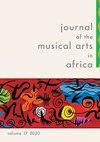African music research and the new empiricism
IF 0.2
4区 艺术学
0 MUSIC
引用次数: 1
Abstract
The past thirty years have seen a resurgence in empirical, data-driven research focused on human musical behaviour. Some researchers have gone so far as to describe this as the ‘comeback’ of systematic musicology (e.g. Honing 2004), while others have noted the potential of empirical methodology in shaping other areas of music research (Parncutt 2007). The most visible example of this is the explosion of music-related research in the cognitive sciences. And, as if by some stroke of fortune, calls for the cross-cultural expansion of empirical data beyond Western materials and subjects have come along at just the same time that African musicology finds itself at a self-reflective crossroad. South Africa represents Africa’s largest musicological community, and to say that it is in crisis is an understatement. The causes of this crisis are many and varied: decreased funding in the tertiary sector in general, calls for decolonisation of curricula and research programmes in the wake of #FeesMustFall, persistent disputes over research ethics, clashes between academics and the university management, and rather unhealthy levels of intradisciplinary office politics. Indeed, the crisis itself has already generated so much literature that there are probably more self-reflective articles on the state of the discipline than published research on a major genre like motswako, or the Nigerian hip hop industry, or even on increasingly threatened traditional African musical cultures. That in itself goes to show that something is very seriously wrong with the way we go about the business of music research. Elsewhere (Ross 2018), I have commented that one overlooked aspect of this crisis has to do with standards of scholarship. In my view this is the greatest long-term threat facing not only musicology in Africa, but the position of musicology within the global academy. We have a discipline divided and under financial pressure, and proposed solutions seem constructive and destructive in equal measure. It is not all doom and gloom, however. African music researchers are in a prime position to take advantage of the rise of empirical methodologies in the study of music. Such methodology is present in an increasing number of fields, from music education and music technology, to market research and music information retrieval. I will here use as my primary example the field of music psychology, not only because it is my own area of specialisation, but also because it represents the largest and most influential empiricallyminded field in current music studies. Music psychology in particular points toward a return to strong, evidence-based argumentation when dealing with music research. Its nature is broadly positivist – that is, it relies on the generation of observable data as a premise for further modification of hypotheses. But at the same time, this positive data is interpreted against the backdrop of theory and carefully articulated philosophical positions about the biological nature of the mind, as well as increasingly nuanced models of human music and musicality. The data-orientated nature of music psychology is such that it produces research非洲音乐研究与新经验主义
在过去的三十年里,我们看到了以人类音乐行为为重点的实证、数据驱动的研究的复苏。一些研究人员甚至将其描述为系统音乐学的“回归”(例如Honing 2004),而其他人则注意到经验方法在塑造音乐研究其他领域的潜力(Parncutt 2007)。最明显的例子就是认知科学中音乐相关研究的爆炸式增长。而且,似乎是幸运的降临,在非洲音乐学发现自己处于自我反思的十字路口的同时,对超越西方材料和主题的经验数据的跨文化扩展的呼吁出现了。南非代表着非洲最大的音乐社区,说它正处于危机中是轻描淡写的。造成这一危机的原因多种多样:高等教育经费普遍减少,“学费必须下降”(#FeesMustFall)运动引发的课程和研究项目非殖民化呼声,围绕研究伦理的持续争论,学术界与大学管理层之间的冲突,以及相当不健康的学科内部办公室政治。事实上,这场危机本身已经产生了如此多的文献,以至于关于这一学科现状的自我反思文章可能比发表的关于莫茨瓦科(motswako)、尼日利亚嘻哈产业,甚至是日益受到威胁的非洲传统音乐文化的研究都要多。这本身就表明,我们研究音乐的方式出了严重的问题。在其他地方(Ross 2018),我曾评论说,这场危机的一个被忽视的方面与学术标准有关。在我看来,这不仅是非洲音乐学面临的最大的长期威胁,也是音乐学在全球学院中的地位面临的最大威胁。我们有一个分裂的学科,在财政压力下,提出的解决办法似乎既有建设性,也有破坏性。然而,也不全是厄运和阴霾。非洲音乐研究人员处于有利地位,可以利用经验主义方法在音乐研究中的兴起。这种方法出现在越来越多的领域,从音乐教育和音乐技术,到市场研究和音乐信息检索。我将在这里以音乐心理学作为我的主要例子,不仅因为它是我自己的专业领域,而且因为它代表了当前音乐研究中最大和最有影响力的经验主义思想领域。音乐心理学特别指出,在处理音乐研究时,要回归到强有力的、基于证据的论证。它的本质是广泛的实证主义——也就是说,它依赖于可观察数据的产生,作为进一步修改假设的前提。但与此同时,这些积极的数据是在理论背景下解释的,并仔细阐述了关于心灵生物学本质的哲学立场,以及越来越微妙的人类音乐和音乐性模型。音乐心理学以数据为导向的本质使得它产生了研究
本文章由计算机程序翻译,如有差异,请以英文原文为准。
求助全文
约1分钟内获得全文
求助全文

 求助内容:
求助内容: 应助结果提醒方式:
应助结果提醒方式:


